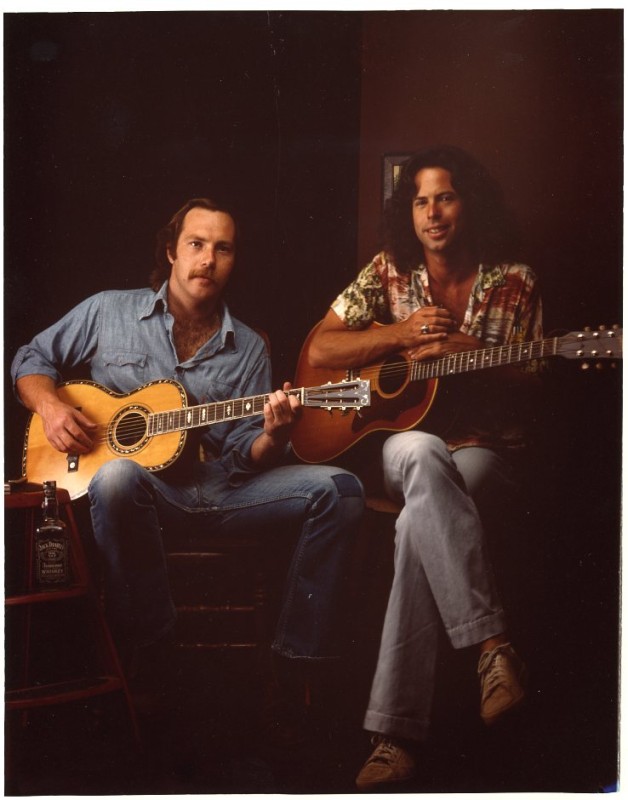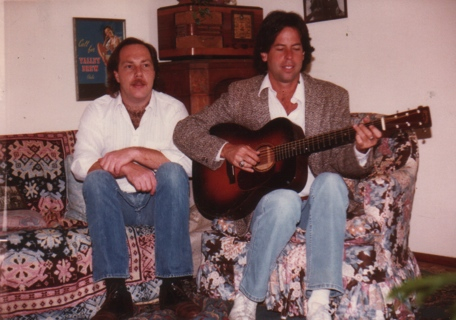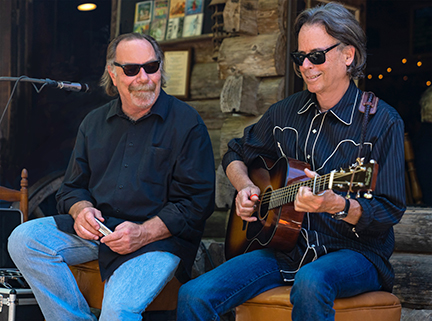There is nothing that exudes the concept of real true country blues more than the great guitar/harmonica duos: Sonny Terry and Brownie McGhee and their heirs Cephas & Wiggins. That tradition is still going strong with duos that are still together today: Eric Noden and Joe Filisko, and Tom Ball & Kenny Sultan, the red-hot duo of from Santa Barbara, California. Since the death of John Cephas and Phil Wiggin’s solo career, Tom Ball & Kenny Sultan are one of the longest running permanently-paired guitar/harmonica duos in America. In 2019, they triumphantly celebrate their 40thAnniversary, outrunning even the great Brownie and Sonny who had a 35-year partnership. Tom Ball & Kenny Sultan are both superb instrumentalists and outstanding interpreters of the country blues. Both play guitar with astonishing virtuosity, but Tom Ball is the singer and the main harmonica player, and Kenny Sultan is plain out as good as it gets as an acoustic guitar picker – a guitarist’s guitarist and an extraordinary fingerpicker. (Check out his own signature Martin Guitar Model 000-18KS, an honor bestowed only on the best of the best.)
Together, they not only carry out the traditions with respect and reverence, but they play with swift passion and fury, as good as it gets when you pair these two instruments.The Flying Fish/Rounder recording artists with eight records under their belt, plus solo albums, have mastered blues, rags, and good time music and have played concerts, clubs, and blues/folk/bluegrass festivals all over the world. Even if their name does not yet ring a bell, you have probably heard their music in countless TV shows, commercials and movie soundtracks. Both are respected teachers and desired session players.
thecountryblues.com caught up with Tom Ball via phone on July 6, 2019 for an exclusive interview about their amazing musical journey over four decades and still going strong:
How it all started

“ I grew up in Los Angeles and so did Kenny, but I didn’t meet him down there. He was up here going to school at University of California Santa Barbara, and I moved up here, and I hooked up with an electric blues band called Blues Company. But it was too rock ‘n’ roll for me. I wanted to play country and acoustic blues. I was looking in the newspaper and I saw this guy’s name Kenny Sultan and it said that he played blues and ragtime guitar. I wanted to go see him play, but I couldn’t go because I was busy gigging with my band. So, I asked my girlfriend if she would go check this guy out for me. She went over to this gig with a clipboard and a piece of paper, and took some notes and came back and said, “Well, he plays ragtime guitar and blues. He played some Blind Blake and Gary Davis and some Lightnin’ Hopkins and he likes to drink Heineken beer and he’s got a good sense of humor.” I figured that’s somebody I should meet. I introduced myself to him at a Blues Society show here in Santa Barbara of Big Mama Thornton He asked me to come over to the house and we’d do some jamming. We played a little bit at his house and then he mentioned that he was going to play on the local radio in a week or so because he was teaching lessons and he wanted to drum up some business for his lessons. We got on a very small radio station – had a radius of about five miles. This club in town called the Sojourner Café, happened to have the radio on and they heard us play, phoned the radio station and offered us $15 and a pizza if we could come down there and play some music for them. We held out for free beers too. We went down there and played our first gig for $15 and a pizza. And people started coming in to hear us play. One thing led to another and pretty soon we were playing all over town and then it just grew from there. Before you knew it we were playing festivals and making records. It’s been a good run.”
How are they getting by today
What we found is that there’s fewer gigs now than there used to be, but there’s all sort of ancillary ways to make money when you’re playing music. Some of the income is from live performance and some is from studio work or background music for TV shows or films. Kenny teaches as well. And there’s other ways to sort of broaden your revenue stream. You’re writing songs and making money off of royalties, songwriter royalties and all these various ways. None of them are particularly lucrative, but when you add them all up you can make a living.
Some of their greatest memories and biggest successes.
Both of us had a background in blues music before we met. I grew up down in the Los Angeles area and was lucky enough to go to the Ash Grove – that was the place that pretty much shaped all of my musical influences, because everybody that played blues and jazz and bluegrass and folk music was always at the Ash Grove. You could go there if you were under age.Once Kenny and I got together, we began playing local clubs. Pretty soon we were touring and we did our first European tour in the late ‘80s. That was always fun. We began going to Europe quite often and we loved doing that. That was very special for us. We love playing festivals. Some them have gone out of business: the San Francisco Blues Festival, for example, Sacramento, Long Beach – Monterey. We even get hired at bluegrass festivals, and that enables us to broaden our spectrum. We do a lot of studio work on other people’s records as a side thing, and that’s always interesting because it takes you out of your comfort zone and you have to learn new material There’s really no highs or lows. It’s all fun. The biggest festival we ever played was probably the Roskilde Festival in Denmark, which had an audience of about 100,000 people. That’s exciting for a little acoustic duo. Some of the other acts were Bob Dylan and also Metallica. So that was always fun. I can’t really pinpoint any particular major accomplishments other than just being together for 40 years playing acoustic music. That’s an accomplishment in itself, I think.
What they want people to know about them
We are from Santa Barbara. We’re white folks. But we don’t try to be something that we’re not. I would feel pretty foolish singing about saddling up my mule or working in a coal mine, because obviously I never had that experience. We write music about the stuff we know about, which is about beer and gambling and women. We try to keep the older music alive, but we also try to write our own songs. Our repertoire is about 50-50 between originals and the older material. We’ll never be able to play a Lightnin’ Hopkins tune as well as Lightnin’ played it, but in many cases, we’re playing for many people who never heard of Lightnin’ Hopkins. If nothing else maybe if they hear us it might inspire them to dig a little deeper and find out where we got these songs from and maybe they’ll get a chance to hear them by the originators, and that’s important.

How things are changing in the business
It used to be we could go to a festival and maybe sell 700 CDs in a weekend. Now, we’re lucky to sell 50. People just don’t buy them anymore. It’s all about downloading and streaming. You just can’t make any kind of money off that any more. It’s a shame, but that’s just the way it works. Now, the other side of the coin is now that you have 600 or so television channels, and you used to only have seven – all those television channels have programming and all that programming demands music. We’re getting a lot more work for background music on smaller reality shows, stuff that you can’t particularly be proud of doing, but they take your music and stick it in the background and then you get a royalty check.
Kenny and I, and a third guy named Brian Mann, who plays keyboards and accordion, we started a music library and we went in and recorded hours and hours and hours of little snippets of music – short pieces, long pieces, fast pieces, slow pieces, whatever we could think of – and then we signed a deal with a music library service – a publishing company – and they make all that stuff accessible. A lot of these TV shows don’t have the budgets to actually hire someone to score the show –that’s too expensive. They go online and start looking through the libraries and then they’ll license it from a music company and then you get a royalty. It’s not enough money to live off, but it’s supplemental income. I think that a lot of musicians probably haven’t explored as many avenues of supplemental income as we have. We discovered a long time ago that you have to have all these various revenue streams if you want to make a living. If you’re making a living only by playing live, what happens if you break your hand and you can’t play guitar, or you get the flu or – there’s no safety net unless you have these other revenue streams.
On music
Tom Ball: I listen to all kinds of music. I mean of course I listen to blues, obviously, but I’m very much involved with jazz and Celtic music and ethnic music, African music. Right now, I’m on a Celtic kick. I’m listening to Kate Rusby a lot, to Paul Brady. Also to older, earlier black gospel music – Swan Silvertones, Dixie Hummingbirds, Five Blind Boys – that kind of stuff. I’m pretty eclectic in my taste. I listen to everything – classical as well. I love lute players – classical lute players. That’s amazing. With Kenny, I’m the harmonica player and singer but guitar was my first instrument.

Their milestones and special memories in these 40 years
We’ve played every place from the tiniest dive bars to massive outdoor festivals. We even played an insane asylum once in the Netherlands. We’ve played clubs where we had to sleep on the stage because they locked the doors and locked us in and we spent the whole night sleeping on the stage. We’ve had people pull guns on us. We’ve had all kinds of experiences. The guy was actually trying to shoot his wife and we tried to get involved, and he pulled it on us after that. Fortunately, he got arrested before he could cause any real damage. That was in Santa Barbara. It was some drunk idiot who got angry at his wife earlier.
We’ve had an awful lot of fun in 40 years and we’ve just driven tens of thousands of miles and seen a lot of countries and had a lot of fun, played on TV in Hungary with John Jackson. It’s been a great career and we’re going to do our 40th anniversary concert in October 26, 2019 here at the Lobero Theater in Santa Barbara, and that’s going to be a big event, so we’re happy – looking forward to that. ”
